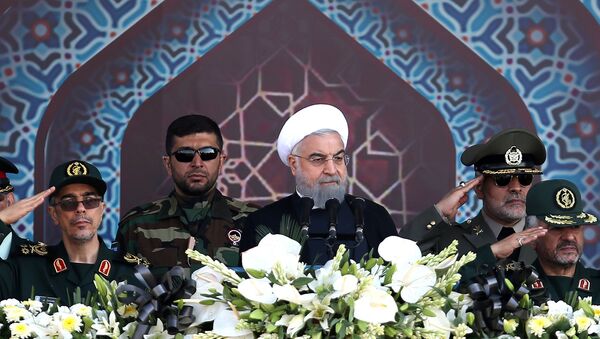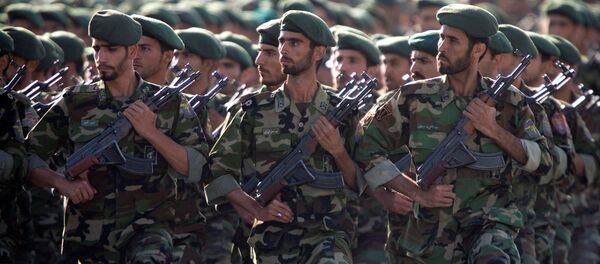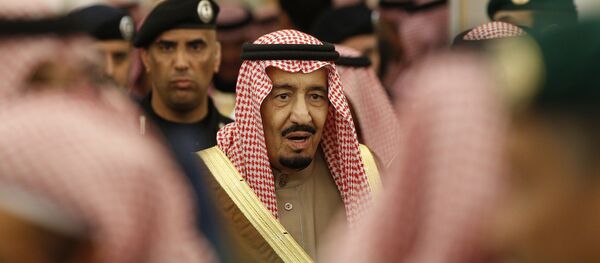As President Donald Trump prepares to make a decision on the future of the Iranian nuclear deal, Central Intelligence Agency (CIA) Director Michael Pompeo lashed out October 12 at the Islamic Republic in a speech at the University of Texas, calling the country "a thuggish police state" and "despotic theocracy."
The incendiary oratory, delivered as the keynote speech at a national security forum in Austin sponsored by the university, was said to "set the stage" for the Trump administration's announcement on the nuclear agreement, expected October 13.
Iran is playing with fire — they don't appreciate how "kind" President Obama was to them. Not me!
— Donald J. Trump (@realDonaldTrump) February 3, 2017
The president is expected to withhold recertification of the agreement and pass the issue to Congress, which then has 60 days to reimpose the sanctions lifted after the nuclear deal was made.
There are also suggestions the Trump administration will designate Iran's Revolutionary Guard Corps a terrorist group, which provoked fury in Tehran, and promises of "firm, decisive and crushing consequences" should that come to pass. Pompeo's speech did little to quell speculation on this point.

"The IRGC are the cudgels of a despotic theocracy, accountable only to a Supreme Leader — the vanguard of a pernicious empire expanding its power and influence. In recent years, the IRGC has become more reckless and provocative, seeking to exploit the vacuum left by instability in the Middle East. When you look at the death and destruction inflicted in Syria, Yemen, and Iraq by Tehran and its proxies, the threat is clear — Iran is mounting a ruthless drive to be the hegemonic power in the region," he said.
The CIA Director even went so far as to compare Iran to terror group Daesh, which Iranian-linked Shiite militias have fought in bloody battles for years.
Friends and Enemies
Pompeo's comments, while highly provocative, echo closely statements made by many other US officials about the Islamic Republic since its 1979 revolution. Perhaps most notoriously, then-President George W. Bush lumped Iran in with Iraq and North Korea in the "axis of evil" — totalitarian governments that sponsored terrorism and sought (or possessed) weapons of mass destruction.
Whether Iran truly is "a thuggish police state" and "despotic theocracy" is very much up for debate, nonetheless. While human rights abuses have been documented by groups such as Amnesty International, other observers have noted the country is extremely open by regional standards.
Elaine Sciolino, a US journalist who has closely covered events in the country for over three decades, noted in 2005 "freedom of thought and expression" was "essential" to the Iranian system, as Shiite Islam "thrives on debate and discussion" — and Iranians are unafraid to criticize the government publicly.
An American Journalist in Iran, From 1979 to Today
— The Bobst Center (@BobstCenter) April 10, 2017
Elaine Sciolino
April 13 — 12pm — 1:20pm in 2-C-18 Green Hall pic.twitter.com/mJVel5Z5R9
Moreover, the US remains closely aligned with countries, both in the Middle East and elsewhere, which many believe to be "thuggish police states" and "despotic theocracies."
In August, over five dozen human rights groups petitioned permanent representatives of member and observer states of the United Nations Human Rights Council, demanding an independent probe into the bloody conflict in Yemen, and Riyadh's leading role in the conflict.
Humanitarian groups have documented numerous instances of civilians being killed and potentially purposefully targeted by Saudi air strikes in support of Yemen's government — and Human Rights Watch has claimed Riyadh has threatened to punish members of the UN Human Rights Council that vote for an independent probe of civilian casualties in the conflict.



